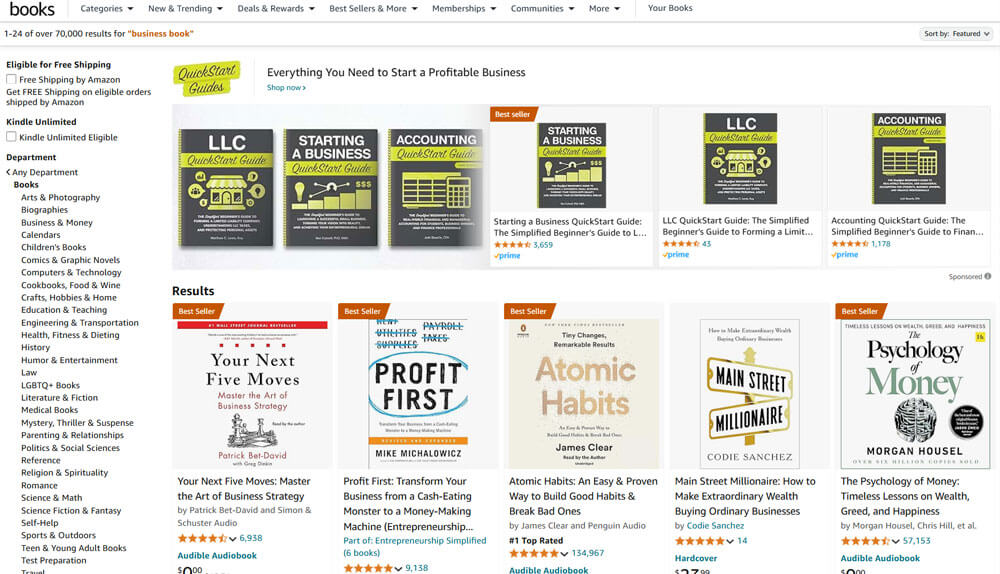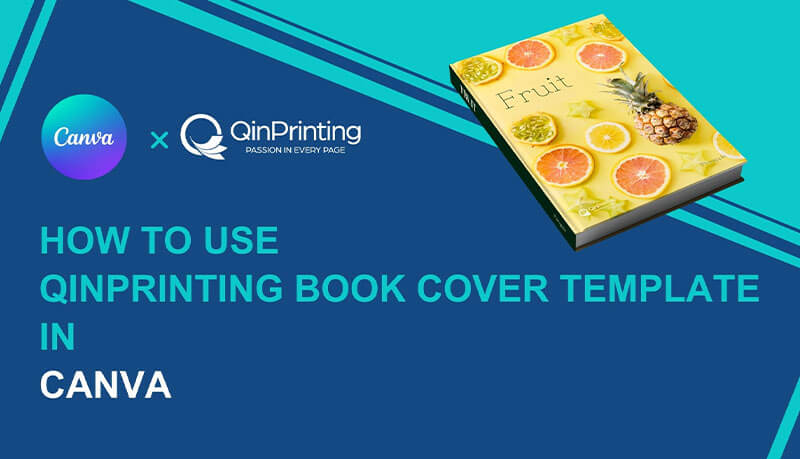If you have experience in the trade, industry, or business sectors, you could build your profile, establish thought leadership, help others, and profit financially from writing and publishing books. We will explain the details you need to get started writing books for business.

The successful entrepreneur's best kept secret
One of the bestselling categories in the printed book market is the trade, industry, and business niche. It's a voracious vertical, always hungry for new material from experienced professionals and entrepreneurs with information, wisdom, insights, advice, and inspiration to offer. It's not the easiest niche to write in but, if you have knowledge and experience to draw on, you can succeed in carving out a niche for yourself in business or technical writing. As an independent author, it's as close as you'll ever get to money on tap.
At QinPrinting, we've printed many successful books by business leaders and entrepreneurs, both for the mainstream publishing houses and independent authors. In this post, you'll find out:
- What kinds of topics and treatments are most likely to sell well as business books
- How to research trade, industry and business markets to generate the best ideas and fresh takes
- The practicalities, writing techniques, and skills you need to get started writing business books
- How to write trade, industry, and business books that are likely to sell
If you check out Amazon – we're not especially promoting Amazon, it's just a useful indicator of what's happening in the book market overall – and do a book search for “business books”, you'll see about 70, 000 titles currently in print. That's a sweet figure. It means there's a hungry market for this kind of book but that it's not saturated, so there's always room for one more! You'll also see that the category breaks down into lots of viable sub-niches, including ideas, management, startups, strategy, planning, funding, scaling, analytics, law, storytelling, sales, innovation, leadership and much, much more. If you dig a bit deeper, you'll find that a healthy percentage of these books – and they're selling – are independently published by experienced business people and successful entrepreneurs at every level.

All this to say, that if you have the experience and something useful or interesting to contribute, you stand a very good chance of doing well with your own business book. The potential gains are not confined to monetary profits, either. Books are an excellent way to promote your enterprise, build your reputation, and establish thought leadership in your niche.
Furthermore, you'll find that in the USA and Great Britain, literally thousands of industrial, technical, trade, and business publications go to the press each week. Most have associated websites, blogs and newsletters, publishing new content several times a day. This is another demonstration of just how hungry this market is for material. Many non-business people aren't aware of the extent of this vertical because the majority of these publications circulate exclusively within the industries they serve — distributed to managers, executives, co-workers, developers, researchers, creatives, manufacturers, suppliers, and customers. So, you won't find them on newsstands.
But they can be extremely useful to anyone wanting to write a business book. You can mine them for ideas on which to expand, to see what generates most interest, what isn't covered enough yet, and what's likely to sell. If you can write well, and you have personal, firsthand experience in business or industry, you don't necessarily need a specialist perspective or inside knowledge to write books for these markets. Never underestimate the power of good research skills. So long as you start from your experience and you understand what business readers are looking for, you can write a potentially successful book – or books! – for the trade, industry, technical, and business market.
What are people looking for from business books?
The spectrum of topics about which business book readers seek information, insights, and inspiration is incredibly wide. For example, they range from informative, authoritative reports on industry matters to technical documents to commentaries, the philosophy and psychology of business, personal success stories, profiles of entrepreneurs, managers, and others who are making a mark in the business world, to every kind of practical and educational handbook on any aspect of enterprise that you can think of!
To write books inspired by topical issues, you need to keep your “finger on the pulse” of the industry or business niche you're targeting. You don't necessarily need an exclusive story not covered elsewhere, as a fresh perspective or useful insight on a hot topic is always welcome. But you do need to work fast and get the book on the market before the story goes stale. The better option is to look for topics which are unlikely to undergo significant changes in the near future, so that you can write books that will still be relevant several years from now. But that doesn't mean your book can't deal with something “newsworthy”. It's often a good idea. Just make sure that it's not the sort of issue that's only “live”for a few weeks or months. Newsworthy stories that may have a much longer shelf life, to give just a few examples, might be:
- How political changes or market fluctuations are likely to influence a business sector in the future (especially if you give multiple possible outcomes)
- Insider gossip, merger stories, unexpected takeovers, successful startups, and shocking bankruptcies of the recent past linked to what we can all learn from them going forward.
- Emerging technologies, software, and services that will roll out over the next decade.
- Analyses of the latest returns, facts, and figures within a niche used as the basis for predicting possible futures and drawing out general principles and lessons from which everyone can learn.
- New research results, product launches, developments in best business practices, and innovative schemes and trials which teach us something fundamental about business innovation and development.
Still, the easiest and most effective books are those written on “evergreen” topics — stories that will still be relevant for at least several years after first publication and possibly forever — or in-depth discussions of topical concerns which are likely to play out over the longer term. Examples of good evergreen topics for business books would be:
- In-depth case studies
- “Futurescapes.” Market, technology, and business process predictions
- Detailed how-to articles on the application of process theories, systems, software, and efficiencies
- Innovative marketing strategies, human resources management, technologies, product development, and training
- Corporate culture and industry leader profiles
You should get copies of any trade, industry and business publications within the niche or vertical that you intend to write for and research and analyze them carefully to make sure that your book concepts are on-message and in line with the kind of material that sells well within the market. But how do you get your hands on these publications if they're not for sale on newsstands and you don't work in the industry they serve? In most cases, a direct approach is what's required. Let's look at how to uncover these markets.

Image by StartupStockPhotos from Pixabay
How to research trade, industry, and business markets
Many independent self-publishing projects — cookbooks, novels, comics, ‘zines, memoirs, and more—are well-suited to introverted or shy personalities. The trade, industry, and business vertical isn't one of them. You need a powerful dose of self-confidence and a bold approach to print and publish successful work in this field. Fortunately, those are traits that most entrepreneurs and successful business people have in abundance! The main methods to uncover opportunities in the business markets are to:
- Contact businesses directly by telephone to ask which publications they own and if they would be willing to either let you subscribe or send you a few back issues. You can offer them a mention in the text of your book or the acknowledgements, at the very least, as an incentive.
- Attend trade and industry fairs and network like there's no tomorrow.
- Sign up to industry mailing lists.
- Visit libraries and ask about trade publications they carry (you'll be surprised what they have in the archives if not on the stacks!)
- Search listings in business guides and directories.
Most trade, industry, and business publications are run by enthusiastic and knowledgeable staff keen to develop ongoing relationships with good, reliable independent writers. So, once you've gathered a handful of well-targeted publications relating to the field or topic your book will be about, don't be shy about picking up the phone, and talking to editors. Most editors will be happy to send you a few recent back issues so you can get a good idea of what they publish. And ask them if they'd be interested in running a feature on you and your book once it's done!
Writing techniques and skills you need to be a successful business writer
As with any specialist market, you'll need a command of appropriate skills and techniques to write books for the business vertical. While you need to know what these are, if you're not confident with them at first, don't be discouraged. Just get started; you can learn on the job.
1. Write for knowledgeable readers
Remember when writing for the trade, industry, and business market, your audience comes already equipped with in-depth knowledge and experience in the field. While you shouldn't pretend to an expertise you don't possess, there's no need to “dumb-down” your writing as you might for an “explainer” in a general interest magazine, for example. You'll need to know your stuff to write high-value book content for the business vertical. But if you don't have a background in the niche you're writing for, that's where your research skills come in!
2. Understand the importance of accuracy and fact-checking
Whether you have prior industry experience or you're writing from research alone, you must check all your facts and make sure any claims you make are accurate; not only because a high percentage of your readers will know, but because your reputation as a business writer – especially if you're aiming for thought leadership status – depends on it. Check all your sources, make follow-up phone calls, and verify everything.
3. How to present technical details
Many business book topics need you to present technical details in a clear, logical, and intelligible way. Good technical writing starts with a good understanding of your subject. You can't fake it. So, factor in as much research time as you need before you start writing. Once you have a solid grasp of what you need to explain, the key is to use the fewest words and the simplest language possible to convey your ideas fully. Technical writing is to every other kind of business writing what poetry is to prose.
4. The 5Cs: correctness, conciseness, clarity, coherence, completeness
The so-called “5Cs” are essential stylistic elements of all good writing, period. But they're especially important when conveying complex ideas to broad audiences and technical details to specialist readers. The 5Cs are:
- Correctness: this doesn't only refer to making sure that all your factual statements are correct, but that your grammar, syntax, and diction are all perfect, too.
- Conciseness: go by the old rule, “Never use a long word when a shorter one will do.” Always strive to say what you need to say in as few words as possible and to make those words as easy to understand as you can. Good business writing is about efficient communication. There's no need to show off that you own a dictionary and a thesaurus!
- Clarity: to make your writing clear, your thinking must be clear first. Use flows, diagrams, and mind-maps to organize your concepts into a logical and coherent pattern before you start writing.
- Coherence: check all your business writing for any accidental inconsistencies or contradictions and resolve them.
- Completeness: make sure that you've said everything you need to say to make your arguments clear, your instructions easy to follow, and that you've given all the important information you promised to give by the end of the book.
There's one issue which you may come up against when you're checking your work for the 5Cs, and that's the problem of “jargon” and complex technical terms. The use of these needn't contradict the five rules stated above. But we'll unpack this issue next.
5. Juggling with jargon
Every specialism, interest, or niche has its jargon — words, terms, and phrases used between people “in the know” that aren't in common usage. It's often thought that jargon serves to exclude outsiders, but its real purpose is usually to save time between those who don't need everything spelled out. This presents a special challenge to the trade, industry and business writer.
While you must know the jargon and how to use it, you should know it well enough to explain it clearly and concisely to someone who doesn't understand it. Your approach will depend on the level of knowledge and experience of your target readership, the scope of your project, and how well you know your topic. There's no universal rule about whether to use jargon, explain it, or omit it. But you should be equipped and ready to do all three.
6. Formulate informed opinions and quote experts
Much business and technical writing doesn't need you to have or express an opinion – although opinion-based books can be hot sellers. It's enough that you communicate the pertinent facts in a comprehensible and logical fashion. But sometimes — especially once you position yourself as an expert in a given niche — readers may want your personal take on an issue. However, there's a big difference between having an informed opinion — which you can back-up and defend with evidence and quotations from other experts — and simply being opinionated. Cultivate the former and avoid the latter at all costs.
Can you make a full-time income from self-publishing trade, industry, and business books?
Of course, there's never any guarantee you'll succeed. That would take all the fun out of enterprise and entrepreneurialism! And remember that many business people and entrepreneurs print a book not so much to make money as to develop status, get speaking engagements, have something more impressive than a business card to hand out at conferences, fairs, and conventions, and to leave a legacy for those that come after them.
With that caveat in mind, business and technical writing for trade and industry is one of the few verticals in which any knowledgeable and talented writer/entrepreneur has a good chance of cultivating long-term sales of multiple books, leading to a reliable income. The best routes into this vertical are to write about a topic in which you have specialist knowledge and, above all, experience. And the word on Indy Street is not to expect overnight success from a single book. Multiple books backed up with speaking engagements, a lively blog, a strong social media presence, and excellent reviews – which all take time – are an almost guaranteed route to success, however,; assuming that you've written a good book.
You can't be shy or half-assed about writing books for the trade, industry, and business sectors. But if you're happy to take the initiative, have good research and writing skills, enjoy a challenge, and are serious about your writing, it's potentially the pot of gold at the end of the rainbow. It takes experience, confidence, discipline, and time. But if that hasn't put you off, then you may be just the right person to make it succeed. Once you've established a reputation as a reliable business writer, you'll find you can command top dollar speaking fees, build a strong client list as a consultant, and make a very comfortable living or prepare for a profitable retirement from the board!

Once you've completed your business book and designed the interior and cover art and layouts, you'll need a printer to turn it into a beautiful object you can hold in your hands – and put into the hands of others. We recommend printing business books in hardcovers with a dust jacket as the standard. It's the traditional way that mainstream publishers release business books and it also meets reader expectations, making it easier to market. You'll also get a higher return on your investment on a hardcover edition than on a paperback. To find out all the technical details, you can start by visiting our main hardcover book printing page.
When you're ready to print, or getting to work on the layout and design of your book, we'd love to hear from you to see how we can help. We have 30 years experience in the industry, an expert dedicated team of designers and printers, start-of-the-art printing facilities, and a worldwide reputation for excellence.
Talk to us. We're here to help!
If you have other questions or need clarification or help with any aspect of preparing your business book for print, shoot us an email to [email protected] or just call us on +1 951 866 3971 and we'll be delighted to do all we can to help you.









